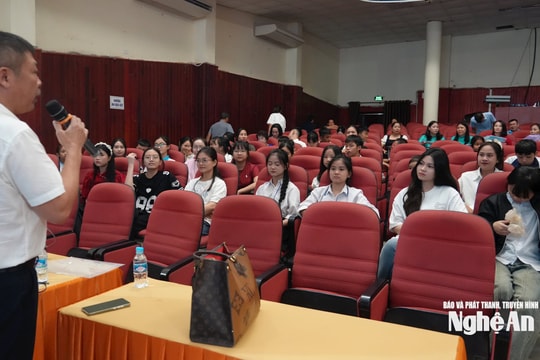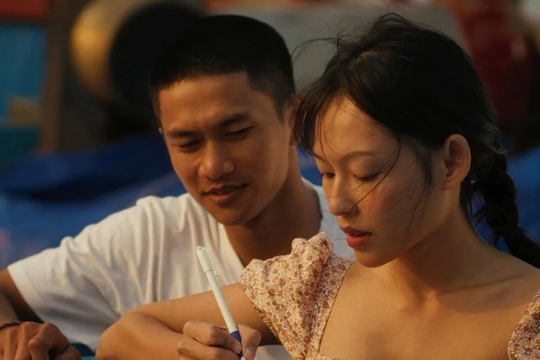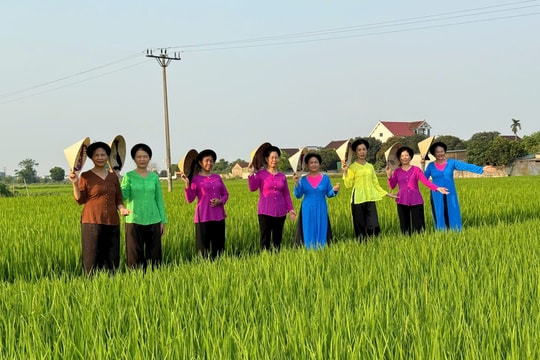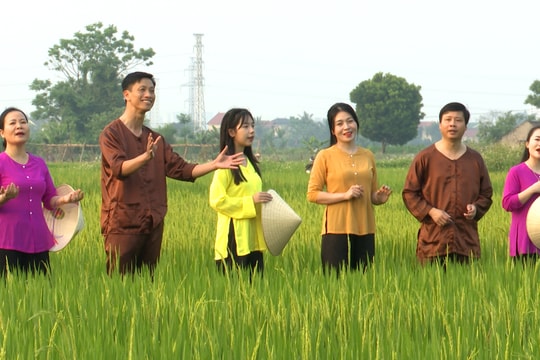Diversify forms of bringing Nghe Tinh folk songs into schools
(Baonghean) - Nghe Tinh Vi and Giam folk songs were born a long time ago, but exactly when is difficult to determine. We only know that Vi and Giam has been a form of folk cultural activity for more than 200 years.
From the labor, production of the guild nature and in daily life, the common people sang the vi and giam songs spontaneously and orally; they were created naturally and then passed down and attached to the people of Nghe An from generation to generation... Just like that, vi and giam were nurtured and developed together with the pure, pristine society and environment, without the impact or influence of foreign, mixed factors.
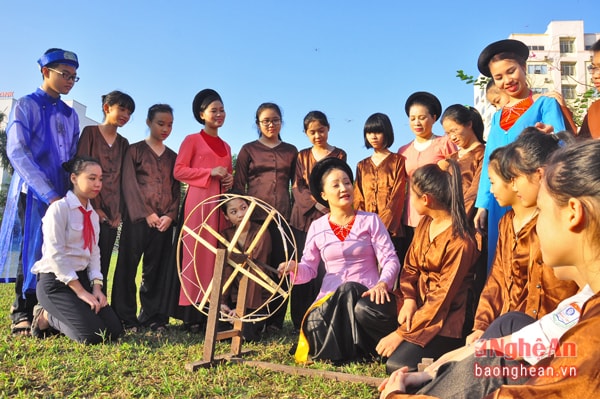 |
| The Center for Preservation and Promotion of Nghe An Folk Heritage guides students in singing folk songs. Photo: PV |
In the current context, Vi and Giam folk songs (like folk songs from many other regions, such as Quan Ho, Cheo, Cai Luong, Ca Tru, Tuong, Xam, Hat Xoan, Hat Gheo) are facing many fierce challenges. After many ups and downs, they still exist and know how to "integrate" to suit the new era. Vi and Giam folk songs now have a different position: from being "popular" songs (associated with farming, rowing, weaving in the fields, river ports, and ferries), now folk songs are a rather "luxurious" form of cultural activity (performed on stage, at tourist attractions, festivals, in lecture halls, and broadcast on radio and television); Folk songs have also gone beyond the countryside of Nghe Tinh, reaching the whole country and even to friends around the world, being honored as a representative intangible cultural heritage of humanity... The villagers who created folk songs are also the ones who silently keep the source of folk songs flowing forever. That credit also belongs to the viewpoint and vision of the government leaders and the dedication and responsibility of the "warriors on the cultural front" of the two provinces of Nghe An - Ha Tinh who have persistently and persistently preserved and passed on Vi and Giam folk songs for the past several decades...
According to preliminary statistics, from the beginning of the 20th century until now, there have been more than 500 articles, 25 books, nearly 20 topics, projects and theses, more than 10 seminars, more than 100 clubs, 3 competitions, hundreds of exchanges, festivals... All of them aim to collect, research, evaluate values, propose solutions and organize implementation to preserve and promote Vi and Giam folk songs... The problem that is raised and also the most worrying thing for experts, researchers and artists is to find appropriate solutions and methods to preserve and promote the value of Vi and Giam folk songs in the new situation. That is to continue to collect and research folk songs; establish clubs; organize competitions, performances, seminars; adapt and compose new lyrics; stage folk songs; promote folk songs, teach singing folk songs on radio, television and clubs...
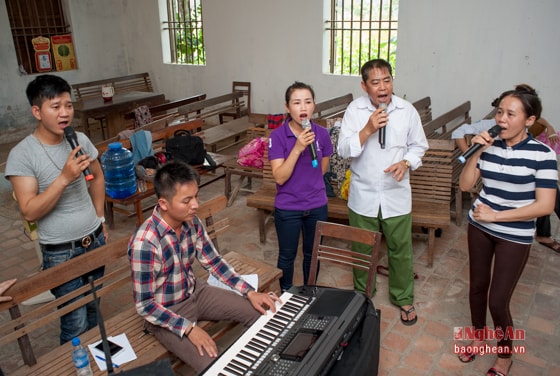 |
| \A practice session of the Vi Giam folk song club of Khanh Son commune (Nam Dan). |
Among the solutions that have been and are being implemented, bringing Vi and Giam folk songs into schools is a solution that has an official policy and is highly feasible because schools are places that have the conditions to pass on folk songs to the younger generation in a systematic, formal and sustainable way. It can be seen that this is not a new issue (schools in the two provinces have implemented it quite early), but up to now, through surveys in schools in Nghe An province, the effectiveness of teaching folk songs is very limited, the reason is that the conditions for teaching folk songs in schools are still lacking and weak, the organization is not synchronous, and lacks systematicity (macro system: policies and mechanisms of levels, departments, branches, schools; micro system: teaching staff, curriculum, documents, teaching methods and assessment methods...). Therefore, it is very necessary to continue to research, study and discuss to make bringing folk songs into schools effective.
As a professional school training and providing human resources in the field of culture and arts, Nghe An College of Culture and Arts has been actively contributing to the preservation and promotion of the values of Nghe Tinh Vi and Giam folk songs. Over the past 20 years, the school has participated in training and providing hundreds of cadres, teachers, and folk singers for art troupes, cultural centers, and high schools in the two provinces of Nghe An and Ha Tinh... Recently, the People's Committee of Nghe An province assigned Nghe An College of Culture and Arts to preside over the science and technology project "Research on Nghe Tinh Vi and Giam folk songs and apply research results to teaching and learning folk songs in schools" (Decision No. 4118/QD-UBND, dated September 14, 2015).
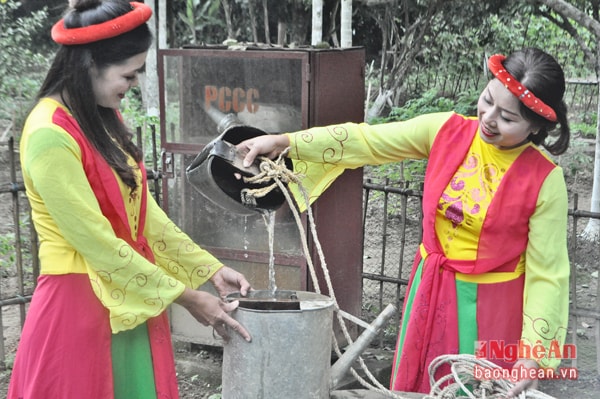 |
| A scene from Nghe An folk songs. Photo: PV |
The general objectives are:Continue to research and evaluate the role, outstanding features and typical values of Nghe Tinh Vi and Giam folk songs as extremely valuable spiritual and cultural products of the country and people of Nghe An; Develop a program for teaching and learning folk songs in general schools and train folk singers, music teachers, and cultural managers in colleges and universities, with the School of Culture and Arts as the core.
In theory:Clearly identify the basic characteristics and typical values of Nghe Tinh Vi and Giam folk songs that need to be taught in schools (general education, colleges of culture and arts); Clarify solutions to effectively organize and implement folk songs in schools (policies and implementation mechanisms; conditions of facilities, teaching staff; issues of coordination between levels, sectors and schools in bringing folk songs into schools)...
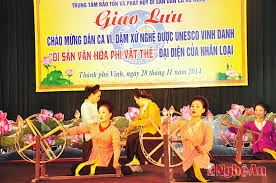 |
| Folk songs are indispensable spiritual food of the Nghe people. |
In practice:It is necessary to investigate and evaluate the current situation of teaching folk songs in schools today (at the secondary and college levels); Experience in bringing folk songs into teaching in localities (regions of the whole country); Proposing programs, materials for teaching folk songs and methods for organizing folk song teaching; How to organize folk song clubs in schools (kindergartens, primary schools, secondary schools, colleges). Some other specific related issues, such as: folk song subjects in relation to other subjects; main or extracurricular curriculum; teaching time, teaching methods; how to choose folk songs for appropriate levels, grades, and blocks; folk song teaching materials for schools; folk song teaching training; conditions for teaching folk songs in schools...
These issues need to be discussed and agreed upon from management levels, functional units to implementation facilities...
Since November 2014, when Nghe Tinh Vi and Giam folk songs were recognized by UNESCO as an Intangible Cultural Heritage of Humanity, it has been more than a year. Implementing the policy of the Provincial People's Committee, on May 28, in Vinh City, a workshop will be held to bring Nghe Tinh Vi and Giam folk songs into schools: From theory to practice. This is the first workshop held after 1 year of Nghe Tinh Vi and Giam folk songs being honored as an Intangible Cultural Heritage of Humanity. This workshop is both an opportunity to review the implementation of international commitments after Vi and Giam folk songs were honored, and at the same time to discuss solutions to bring Vi and Giam folk songs into education and training in schools - one of the necessary solutions, capable of ensuring that folk songs have a sustainable and long-term vitality in contemporary society.
Associate Professor, Dr., Meritorious Student Phan Mau Canh
(Principal of Nghe An College of Culture and Arts)

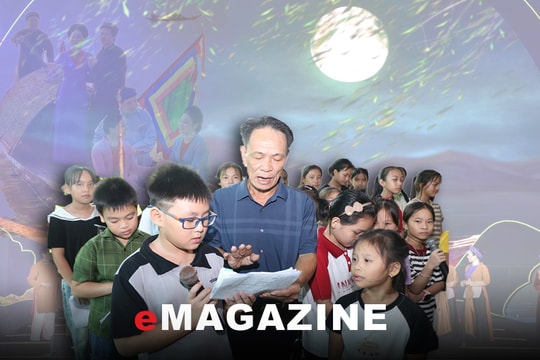
.jpg)
